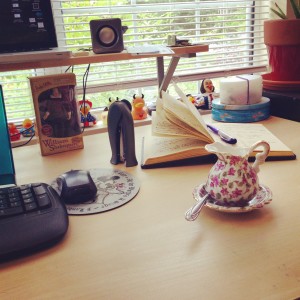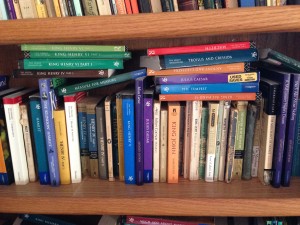Over the past several years, I’ve had the enormous opportunity to do a great deal of teaching. I’ve had some extremely smart, talented, and driven students come through my classroom and I genuinely loved working with every single one of them.
I’ve also made a few observations about some of the most common mistakes that students make in a university setting. Between mentoring my own students, listening to my mentors tell stories about their experiences, and discussing teaching with colleagues, I’ve come to recognize a few basic patterns that students can develop which are ultimately destructive to their success in the classroom.
This is not to say that every student will make the same mistakes (far from it), or that

Jumbo: Tufts’ Mascot and one of my favorite things to teach about
avoiding these mistakes will guarantee top grades, but certainly remedying these issues can nip failure in the bud. Because I am discussing student patterns in general and not the behavior of any specific student (mine or otherwise), I don’t feel like I am betraying confidences to share these patterns in hopes that thinking about them might benefit university students in general. Please do note that I am not referencing any single incident or individual at any time, but rather a series of observations made over the years in dealing with many bodies of students.
Communication
If I had to pinpoint a single thing that could increase classroom success, it would be communication between student and professor. Instructors genuinely want their students to do well and are (on the whole) fairly generous with their abilities to help students do well. Student communication is key to unlocking this. If you feel you are struggling, reach out to the instructor. Chances are they have noticed and have a few ideas for how you can improve, or what you might do to remedy your situation. They also might know about university resources that can help you outside of the classroom should your issue be persistent/long term.
Office hours are a severely under-utilized resource. I can’t count the times I’ve sat in my office available and willing to help anyone who dropped by with no visitors to help. Simply taking a moment to stop by office hours with a clear problem in hand is the first step towards solving it.
This goes double if you know that an issue is brewing. If you know you are going to miss class for some reason, be late, or arrive in a state that isn’t best suited to learning, communicate this with your instructor well in advance of the conflict. Most of us are much more willing to be lenient when the students plans for a problem than we are to be forgiving after a student has a problem.
Planning
Look at your schedule for the semester as a whole; do you have several assignments due in one lump “crunch time”? Are you going to be out of town unavoidably for a long weekend? Do you foresee any reason why you might not be able to execute what the instructor asks of you? Then discuss this with your professor. I cannot stress enough how important it is to plan well in advance; this shows your professor that you care greatly about your success, that you have the skills to deal with managing your own time; and that you can be trusted with privileges such as extensions and extra credit. Your instructor wants you to take your success as seriously as they do, and proper planning can help assure them that you are doing everything in your power to succeed.
This can also apply to your assignments; leave yourself ample time (particularly if you’ve never before completed an assignment like what your instructor has asked for). This way, if you run into a hitch, you have plenty of time to ask for help or clarification. Remember: instructors do not answer e-mails 24/7. If you leave your big paper worth a significant chunk of your grade to the last minute and are held up because you need input from your instructor, you might be putting yourself in a bad situation that could have been entirely avoided.
Not Reading the Syllabus
The syllabus is designed to be your go-to resource for pretty much anything you might want to know about the course. There’s a reason that they can be so long! Chances are, if you have a question, the syllabus will have your answer. Before e-mailing or taking class time to ask your professor what day something is due or how your grade will be calculated, check the syllabus. If your answer isn’t there or is unclear, then you can definitely feel free to ask the question. Always look at the syllabus first; your instructor spent a lot of time crafting it to help you out in situations like this one!
Always remember: your instructor is someone who loves learning, loves the subject matter, and is invested in helping you succeed. We are on your side, and we are always hoping to help you improve over the course of the semester. We can’t carry you to the finish line, but we can definitely coach you there!








